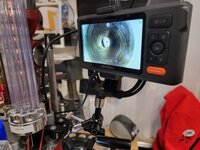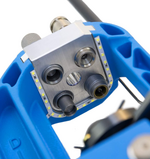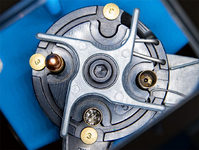- Messages
- 47
- Reactions
- 46
For bulk loads, I use a progressive press but I've always worried about the powder drop failing and getting a light/heavy load. I've tried "powder cops" of various forms - mechanical and those with electronic indicators. While they work okay, I've still been worried about getting the powder amount wrong. This is especially a concern for small mouth bottleneck cases - like .223 Rem. I've really wanted a visual inspection - like I do for precision loads. On my single stage press, I can visually check each and every load before seating a bullet. I find this difficult on the progressive press since I have trouble seeing in the case. The attached picture shows my latest attempt to address this concern - it's a commercial borescope/monitor attached to a Hornady Powder Cop body. I had to drill the powder cop out a bit, but it works really well to hold the borescope end. Just thought I'd share in case others are looking for a similar solution.
















